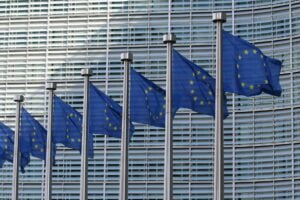In the Netherlands, there are various initiatives that are working on improving the digital position of the country. How do the CoE-DSC and Topsector ICT collaborate? What are data sharing trends and how can we shape the future? We spoke with Frits Grotenhuis, director of Topsector ICT and with Peter Verkoulen, programme director of the Centre of Excellence for Data Sharing and Cloud (CoE-DSC).
Collaboration between Topsector ICT and the CoE-DSC
As part of the innovation policy of the Ministry of Economic Affairs, so-called ‘top sectors’ have been defined. A top sector is a sector in which Dutch businessed and research centres excel worldwide. The purpose of these is to strengthen the international position of the Netherlands, which has a positive impact on society. Frits: “With Topsector ICT, we advance the digital transition by sharing knowledge and realising innovation with ICT. We focus on seven key enabling priority technologies which are considered crucial for economic growth, competitiveness and innovation. ‘Data Science, data analytics and data spaces’ is one of them. To stimulate development, we work closely with national coalitions, knowledge institutions, business and the government. For example, the CoE-DSC is our point of contact for everything related to data and the Netherlands AI Coalition for AI related topics. We join forces at a national level so we can have an influence at a European level.” According to Frits, this public-private cooperation or the so-called triple helix model – in which knowledge institutions, businesses and public parties work closely together to promote economic and social development – is unique. “We are a small country and resources are limited – only together can we realise the greatest impact and have an influence on the European standards.”
As Frits says, the CoE-DSC is one of the national coalitions that Topsector ICT collaborates with. Peter: “We, along with other coalitions – including Netherlands AI Coalition, Commit2Data, Future Network Services, dcypher, and Dutch Blockchain Coalition – operate under the wings of Topsector ICT. The Topsector is a broader umbrella hanging over us, providing content, contacts, and financial support. It gives the coalitions justification. Frits speaks with the coalition managers several times a year, so that we are aligned and work together when possible.”
In the Netherlands, there are quite a lot of initiatives related to data. Therefore, one of the tasks of Topsector ICT is to be a national director that brings parties together so they can reinforce each other. “We also have several grant instruments, one of which is an international trade fair budget, which makes it more accessible for companies to be present at those fairs. For example, the Hannover Messe (which takes place from April 22 to 26) is one of the strategic fairs we support. It’s important to meet like-minded people and discuss what trends you see and how to anticipate them or build on them. Therefore, we also asked the CoE-DSC to attend this event with several of its participants and Peter will present a session there.” Topsector ICT can also use other subsidy instruments to help fund research projects related to data or networking activities, for example. “This allows us to give ecosystems and coalitions a boost to move them, us and the Netherlands forward. We do this based on the strategic Knowledge Innovation Agenda (KIA).”
Societal challenges that data can help solve
With the Mission-Driven Topsectors and Innovation Policy (Missiegedreven Topsectoren- en Innovatiebeleid, MTIB), the Dutch government is challenging business, science, civil society and organisations to work together on solutions to key issues. Five central missions with societal impact have been defined and data can help solve these. Frits explains.
- Energy transition: “Using data, you can for example optimise the network with the help of AI. This is part of the solution to solve grid congestion. Insights in the highs and lows in energy usage can be used to improve the system and save a lot of costs.”
- Circular economy: “Data allows you to better map energy flows, for example, and make better adjustments based on insights. Data is also used for decentralised technologies such as blockchain, to see the origin of data, its authenticity and which adjustments have been made along the way. This enables you to improve carbon tracking, for example.” This is useful, because companies are now increasingly being held accountable for their carbon footprint. Besides data, the digital product passport can also play a crucial role in achieving a circular economy. With this passport, companies digitally record the composition and technical data of their products from A to Z.
- Health & care: “Digitalisation can make improvements in prevention possible, and thus cost-savings, but also improvements in cure and care (offering customised treatment, think of DNA-sequencing). Interoperability, sovereignty, and privacy are important aspects in this context.”
- Agriculture, water and food: “Data can be used to set up agriculture in a smart way, for example for precision agriculture – by adjusting light and water – to make crops grow optimally. Data (and data as a raw material for AI) plays an important role here.”
- Safety: “Using data, you can map risk areas, such as nightlife and entertainment areas or make estimates of the likelihood of incidents occurring and anticipate them in order to prevent instead of being reactive.”
Frits: “When not a lot of data is shared, however, you risk creating your own bias. In healthcare, for example, studies have often been done on men, as a kind of standard. This is too limited. How reliable, clean, transparent and comparable is your data? What is the size of your data set and thus the validity of your statements? The more data is shared and the more diverse it is, the better the results will become. Hence, to help solve societal challenges, collaboration with different stakeholders is crucial.”
The future: from thinking to doing
In February, the Data Sharing Festival took place. A few things stood out to Peter and the importance of collaboration is one of them: “Thanks to the position of the Netherlands in the field of digitalisation, we can actively contribute to European developments. Among other things, the CoE receives funding to make this happen, whilst other countries are more passive in this respect.” Compared to last year, the festival was organised with some involvement of others. This year, the event was organised together with more different parties, such as Topsector ICT and International Data Spaces Associations. “This matches the direction we want to go: scaling up, ensuring that a group of parties all want or support it, and (international) cooperation.”
Peter continues: “The central theme was ‘from thinking to doing’. We shouldn’t do yet another experiment where you show in a laboratory environment what you can do. We need to start working on adoption and scaling up, on realising projects. Secure and controlled data sharing can help solve social and economic issues, and that’s where the focus should be.” During the festival, there was also a focus on Privacy Enhancing Technologies (PETs) and what these can do for the ‘traditional’ data space world in terms of data sovereignty. “The importance of data sovereignty, where you control what happens to your data, for both companies and individuals is increasingly being recognised. It is a prerequisite for sharing and combining data. PETs, for example, help you share insights without sharing data, thus data can’t be traced back to an individual. If a citizen has shared medical data, they should have control over it. It should not be the case that the person applying for a mortgage at a bank is refused because of certain medical problems such as a pacemaker.”
According to Peter, we also have to give extra attention to the community of service providers. “We are already working on this with the CoE-DSC. We can continue to experiment, but if service providers like KPN don’t have solutions in their portfolio that organisations can buy and deploy, we’ll never get to the point of adoption. I see the Data Sharing Festival as the starting point for ‘from thinking to doing’.” Frits agrees: “The festival is a great example of the fact that the Netherlands is in the forefront of ICT at the European level. There is momentum now, we are setting things up and achieving things together. Think of Gaia-X and the European Data Spaces, for example in the field of Health, where we are involved. We must cooperate to stay in the forefront at the European level in terms of ICT. Not as a goal in itself, but to help determine the data standards of the future so that the Netherlands is well aligned with these. If this is the case, we are a relevant player to collaborate with at the European level and Europe remains a strong and relevant player on the global stage. This is important, because we don’t want to become dependent on standards from other large players, such as China or the USA. We want to be involved in determining what the digital transition, preconditions, standards, and thus what our future will look like.”




